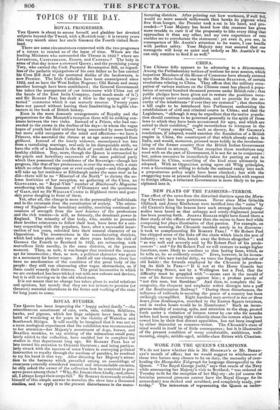TOPICS OF THE DAY.
ROYAL PROGRESSES.
Tan Queen is about to amuse herself, and gladden her devoted subjects beyond the Tweed, with a Scottish tour : it is twenty years this very month since her uncle GEorkoz the Fourth visited Scot- land.
There are some circumstances connected with the two progresses of a nature to remind us of the lapse of time. Where are the leading Ministers who surrounded the Throne in 1822? where are LIVERPOOL, CASTLEREAGH, ELDON, and CANNING? The baby in arms of that day is now a crowned Queen ; and the promising young Tory, who carried the Cash Payment Resumption Bill, as regard- less of the pathetic objurgations of his own father as he has carried his Corn Bill deaf to the muttered dislike of the landowners, is now Premier. The Irish Catholics have been emancipated since 1822, and so have the West Indian Negroes ; Old Sarum and many another borough have been annihilated ; the General Government has taken the management of our intercourse with China out of the hands of the East India Company, (and much made of it!) and Sir ROBERT PEEL has dealt a blow to the system of " pro- tected " commerce which it can scarcely recover. Twenty years have not passed without leaving their handwriting in legible cha- racters in the book of British history.
Even in the mere domestic arrangements of Royalty and the preparations for the Monarch's reception there will be striking con- trasts between the two visits. Instead of a Prince, who had suc- ceeded to the crown in the decline of his days—in whom the vague hopes of youth had died without being succeeded by more homely but more solid occupants of the mind and affections—we have a Princess, who ascended the throne at an age scarce escaped from girlhood. Instead of the lonely widower, emancipated too late from a tantalizing marriage, real only in its disreputable strife, we have the wife of a husband in the flush of youth and the mother of healthy children. Nay, more, though the Queen is surrounded by the pupils and hereditary successors of the same political party which then possessed the confidence of the Sovereign—though her progress, like that of her predecessor, is over the waves, with a state which no other Sovereign can or ever could equal—and though she will take up her residence at Edinburgh under the same roof as be did—there will be no "Minstrel of the North" to dictate the so- lemn festivities of her reception, no gathering of the Clans, no GLENGARRY, no " Royal-Visit " number of Black wood's Magazine overflowing with the humours of O'DOBERTY and the quaintness of GALT, and no Sir WILLiest CURTIS in Highland trews and goat- skin purse dangling in front of them.
Yet, after all, the change is more in the personality of individuals and in the externals than the constitution of society. The aristo- cracy of England—the hereditary nobility, receiving continual ac- cessions of strength from the novi &mines of the professions and the rich traders—is still, as formerly, the dominant power in England. The minority of that body, who, unable to persuade their brother aristocrats to follow their lead, have been for a cen- tury coquetting with the populace, have, after a successful insur- rection of ten years, subsided into their natural character of an Opposition. The insurrections in the manufacturing districts, which had taken place only two or three years before the visit of GEORGE the Fourth to Scotland in 1822, are reenacting, with marvellous little novelty, in the same districts, at the present moment. Then, as now, it was hunger that rendered the masses apt for insurrection ; then, as now, a political character was given to a movement for better wages. Amid all our changes, there has been no amelioration of the condition of the great body of the people : they still run clamouring after vague abstractions, as if these could remedy their distress. The great locomotive in which we are embarked has been tricked out with new colours and devices, but it is still moving on in the old wheel-ruts.
It is not meant that no change has taken place in social relations and opinions, but merely that they are too minute to promise (or threaten) material alterations in the forms and working of the state for long years to come.


























 Previous page
Previous page